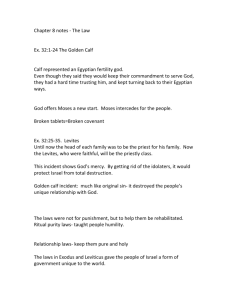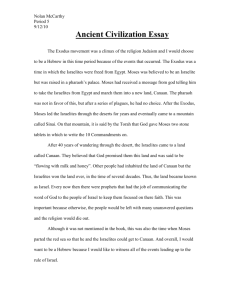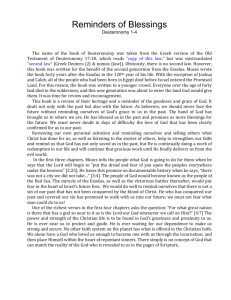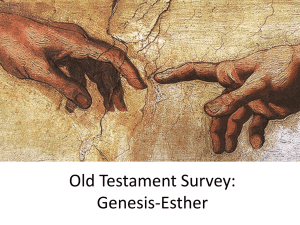Moses and the Law of Israel Session 3
advertisement
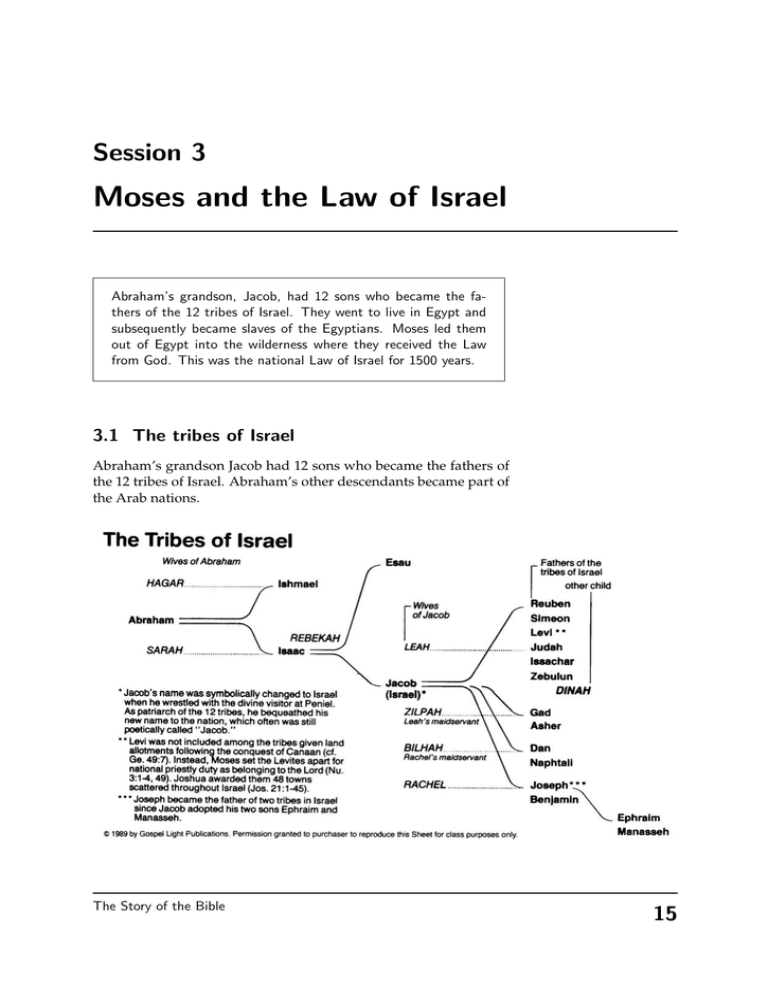
Session 3 Moses and the Law of Israel Abraham’s grandson, Jacob, had 12 sons who became the fathers of the 12 tribes of Israel. They went to live in Egypt and subsequently became slaves of the Egyptians. Moses led them out of Egypt into the wilderness where they received the Law from God. This was the national Law of Israel for 1500 years. 3.1 The tribes of Israel Abraham’s grandson Jacob had 12 sons who became the fathers of the 12 tribes of Israel. Abraham’s other descendants became part of the Arab nations. The Story of the Bible 15 Session 3. Moses and the Law of Israel Jacob and his family left the land of Canaan and moved to Egypt because of a severe famine around 1650 B.C. There were about 75 of them in total. In a little more than two centuries, they had grown to about 2 million and had become slaves to the Egyptians. 3.2 The exodus from Egypt At the age of 80, Moses delivered a message from God to the Pharaoh of Egypt, “Let my people go!”. Not only did God want to deliver his nation from slavery, but his purpose was also to display his power over Egypt, the most powerful nation of the day. Exodus 9:16 Only after a catastrophic succession of plagues, culminating in the death of the firstborn of all in Egypt, did the Egyptian ruler relent long enough for Israel to escape through the Red Sea. The Ten Plagues 1. 2. 3. 4. 5. 6. 7. 8. 9. 10. Blood Frogs Gnats Flies Livestock Boils Hail Locusts Darkness Death of first-born Exodus Exodus Exodus Exodus Exodus Exodus Exodus Exodus Exodus Exodus 7:14–25 7:25 – 8:15 8:16–19 8:20–32 9:1–7 9:8–12 9:13–35 10:1–20 10:21–29 11:1–10; 12:29–30. The wonderful miracles God performed for his people at this time and his continued deliverance of them were constantly brought before Israel in later years to remind them that they owed their existence to him. The most dramatic of these was the opening of the Red Sea which provided an escape for Israel and doom for the Egyptians. The word Exodus simply means “going out”. But to leave Egypt behind truly, God’s people had to learn to turn away from “self” and depend on their Maker. It was to teach them this lesson that God brought them into the wilderness (Deuteronomy 8:2). The Story of the Bible 16 Session 3. Moses and the Law of Israel 3.3 The Law of Moses With their enemies destroyed, and themselves delivered by demonstrations of miraculous power, Israel could never doubt that God had made them and preserved them. Israel’s privileges depended on their faithfulness to their God. In order to develop this loyalty, the Law of Moses was given, the tabernacle was set up, priests and Levites were appointed and a sacrificial code instituted. Exodus 20: The ten commandments Read Exodus 20:1–21. 1. Is there any difference between the first and second commandments (v3–4)? 2. God said he punishes “to the third and fourth generation of those who hate me”? What does this mean? 3. What does God mean by “showing love to a thousand generations of those who love me”? 4. How is it possible to misuse the name of God? 5. Why do you think God wanted the Israelites to keep the Sabbath day? How could they “keep it holy”? 6. Do people really live longer if they honour their parents? (v12) 7. Why were the people afraid? Why wasn’t Moses afraid? The 10 Commandments 1. You shall have no other gods before me. 2. You shall not make for yourself an idol . . . you shall not bow down to them or worship them. 3. You shall not misuse the name of the Lord your God; for the Lord will not hold anyone guiltless who misuses his name. 4. Observe the Sabbath day by keeping it holy. 5. Honour your father and your mother, so that you may live long in the land which the Lord your God is giving you. 6. You shall not murder. 7. You shall not commit adultery. 8. You shall not steal. 9. You shall not give false testimony against your neighbour. 10. You shall not covet . . . anything that belongs to your neighbour. Exodus 20:1–17 Deuteronomy 5:6–21 The Story of the Bible 17 Session 3. Moses and the Law of Israel All ten commandments clearly show man’s obligations and responsibilities to others. First to God, second to family, third to all humanity. Note that there is no commandment which draws attention to self. Selflessness is therefore one of the dominating features taught by the ten commandments. In every commandment there is the call to deny self, and live only to serve others. While the commands given to Moses were meant for the nation of Israel, the principles behind them apply with equal force today. Jesus showed that the essence of the Law is to Love the Lord your God with all your heart and with all your soul and with all your mind. . . Love your neighbor as yourself. (Matthew 22:37–40) Jesus reaffirmed 9 of the 10 commandments giving them an even greater meaning. The only commandment not restated in the New Testament concerns keeping the Sabbath. In fact, we are told to keep God in our lives every day, and that there is no need to hold one day Colossians 2:16; Galatians 4:10 as special above others. In addition to the 10 commandments, further statutes and judgements were given. These expressed God’s will on a variety of matters, and provided laws which regulated the attitude of the Israelites to God and his worship, to each other, and to the nations among which they dwelt. These various laws and ordinances together came to be known as the Law of Moses. Obedience to the Law would have guaranteed Israel continued occupation of the Land of Promise until Messiah appeared. Laws of social justice If you take your neighbor’s cloak as a pledge, return it to him by sunset, because his cloak is the only covering he has for his body. What else will he sleep in? When he cries out to me, I will hear, for I am compassionate. (Exodus 22:26–27) Do not pervert justice; do not show partiality to the poor or favoritism to the great, but judge your neighbor fairly. (Leviticus 19:15) When you lay siege to a city for a long time, fighting against it to capture it, do not destroy its trees by putting an ax to them, because you can eat their fruit. Do not cut them down. Are the trees of the field people, that you should besiege them? (Deuteronomy 20:19) Do not muzzle an ox while it is treading out the grain. The Story of the Bible (Deuteronomy 25:4) 18 Session 3. Moses and the Law of Israel The Story of the Bible 19 Session 3. Moses and the Law of Israel The purpose of the Law One reason why God gave the Law was to establish Israel as a unique people, directing their minds towards his thoughts and ways, so that other nations would admire them, fear them, and fol- Deuteronomy 4:6–8; low them. This Law disciplined the people in divine thinking. It 28:9–10 brought God to the mind of the people in every way—in the home, in their education, in the field, in the workshop, and in their daily (not just weekly) worship. The Law very effectively revealed that human beings were sinners before God and in need of redemption. There was no hope of life Romans 5:20; Galatians apart from the promised Messiah, for no man was able to live a life 3:19 Romans 3:21–23 without committing sin. But above all, the Law was designed to direct the nation to Christ, the promised redeemer. It was this one great offering that God had Galatians 3:24 promised in the covenants made in Eden, and to Abraham, and Genesis 3:15; 22 which was fulfilled in Christ. Colossians 2:16–17 3.4 In the wilderness It was a scene of glory when Israel left Mt Sinai after a stay of about twelve months. A journey of only a week or two separated them Exodus 19:1; Numbers from the Promised Land, but within a few days the people had be- 10:11 come dispirited by the hard, tiring walk through the barren and desolate wilderness. Numbers 13: The twelve spies Read Numbers 13:1–14:10 1. What was it that worried the 10 spies? 2. Who were the Nephilim? 3. How could Joshua and Caleb have such a different report from the other 10 spies? 4. Why do you think the people believed the 10 spies rather than Joshua and Caleb? 5. What can we learn from this incident? As a result of the people’s disbelief, God made them wander in the wilderness for 40 years. All of the people of that time died in the wilderness, except Joshua and Caleb. It was their descendants who entered the Promised Land. The Story of the Bible 20 Session 3. Moses and the Law of Israel 3.5 Conquering Canaan Moses never led the people into the Promised Land. He died at the end of the long period in the wilderness and Joshua took over as leader of Israel. It was Joshua who led the people of Israel into the Promised Land of Canaan (now Israel). Perhaps the most famous incident from this period is the conquering of Jericho. The people marched around the wall for seven days. Then, when they shouted, God caused the walls of the city to collapse and Israel captured the city. This was part of the initial, central campaign to conquer Canaan. Following this central campaign, two further campaigns were conducted by Joshua against the confederate forces of the Canaanites in the south and also in the north. The strong nations were subdued and it remained for the individual tribes to move to their allocated territories and to wipe out the remaining pockets of resistance. God had thus honoured his promise to take Israel out of Egypt and bring them into Canaan. This section of history closes with Joshua’s last words to the nation he had served so faithfully. He reminded them of the indisputable blessings showered on them as a nation from the call of Abraham onwards. God had guided the course of their national life, saving and delivering them in times of peril. This realization is made the basis of his final plea to the people to serve God in spirit and in truth. Homework 1. Read Deuteronomy 14. What do we learn here about what our attitudes should be to: (a) death and bereavement; cf. 1 Thessalonians 4:13 (b) food and bodily indulgence; cf. 1 Corinthians 10:23,31 (c) money and possessions cf. 1 Corinthians 16:2 2. Read Deuteronomy 7:1–5. In what ways were the Israelites to deal with the idolatrous inhabitants of Canaan? What does this illustrate about a Christian’s duty of separation from sin and the world? 3. In Deuteronomy 7:6–11, what reasons does God give the people for this drastic attitude? What New Testament principles correspond to this? (See 1 Peter 1:15–16; 2:9–12). The Story of the Bible 21
